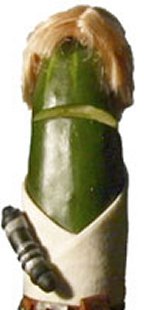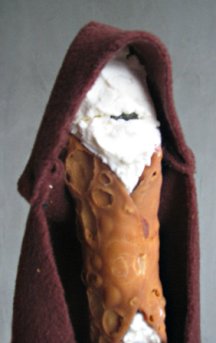Star Wars Goes Organic
M&M chocolate-candy commercials are among the more entertaining on television. In the latest one, a plain and a peanut M&M character meet with Darth Vader of Star Wars. After a little muscular persuasion by Darth, the M&M guys announce they’ll join “the dark side.”





M&M/Mars calls this its first installment in “Chocolate M-pire,” an ad campaign through which the company is unveiling a new line of candies filled with semisweet, dark chocolate instead of milk chocolate.
The candy company isn’t the only food promoter to latch onto the May 19 release of the final Star Wars installment, but one product tie-in is surprising. The Organic Trade Association (OTA) has just unveiled its own unofficial version of the science-fiction epic (http://www.storewars.org/noflash/index.html). Its 5-minute short subject—Store Wars: The Organic Rebellion—is a supermarket-based parody of the early Star Wars movies.
The organic-food-growers’ film opens with Obi-Wan Cannoli entreating Cuke Skywalker to help rescue Princess Lettuce from Darth Tater on the Dark Side of the farm. Along the way, Cuke—the lightsaber-wielding knight—recruits Ham Solo and Chewbroccoli to lead a rebellion in support of organic agriculture.
What’s going on here?
“One of the Organic Trade Association’s ongoing goals is to help educate people about what organic farms and agriculture are about,” explains Holly Givens. “And it can be a challenge, sometimes, to look beyond our core users.”
OTA defines organic foods as “products produced under the authority of the Organic Foods Production Act,” which restricts the “organic” label to “materials and practices that enhance the ecological balance of natural systems and that integrate the parts of the farming system into an ecological whole.” Most organic farmers eschew pesticides—especially synthetic ones—and work to promote biodiversity.
Givens says the OTA movie is intended to appeal to the usual organic-foods constituency plus “a slightly younger crowd.” She adds, “We thought that this particular spoof might be a way to do that. It would offer a really lighthearted way to think about the choices people make in grocery stores . . . and the ramifications of those choices.”
All-produce production
OTA turned over creative control of the enterprise to Free Range Graphics, a group of artists and communicators with a clear point of view on social issues. Its other clients range from the Ecological Society of America to Greenpeace and Planned Parenthood.
“We know we could be using our talents to sell cheeseburgers or sneakers,” Free Range Graphics says on its Web site, “but we feel that an inherent part of creativity is the creation of something positive and meaningful. That’s why we concentrate on offering . . . design and publicity services to companies and organizations whose vision goes beyond turning the world into a strip mall. . . . [T]hey all share our belief that a life’s work should create, not corrupt.”
The Star Wars parody, however, was a labor of love, observes Free Range’s Tate Hausman. He and two of the firm’s founders—Jonah Sachs and Louis Fox—have known each other since age 3, says Hausman, and together played at being Star Wars heroes Skywalker, Solo, and Chewbacca. They also made videos, wrote songs, and basically had fun with the Star Wars theme.
The new production “is just a continuation of our middle school days,” Hausman told Science News Online.
During the production, the guys got to light firecrackers and explode eggs, which played storm troopers in the grocery film. To outfit the story’s imperial soldiers, played by bananas, the team scavenged rifles from action-figure dolls and hot-glued the weapons onto the fruit. To film the splattering destruction of the Empire’s Death Star, played by a melon, the team dropped the fruit from a ladder.
The filmmakers insisted on authenticity. Cuke Skywalker is an actual cucumber with a section sliced through to create a head. A string attached to Cuke’s back opens and closes the slice so the all-organic actor can talk.
Cuke and his comrades are essentially vegetable puppets—”vuppets,” Hausman calls them. “We hope to do more vuppetry in the future,” he says, “because it was really fun.”
The movie was even shot on location. The Star Wars canteen scene is set in a grocery’s salad bar. The lightsaber duel between Cuke and Darth take place before a bin of lettuce. “When you see Cuke flying his X-wing sushi-fighter through the aisles of a supermarket, that’s a real supermarket,” Hausman notes—El Cerrito Natural Grocery, just north of Berkeley, Calif. The store’s owners were quite accommodating, he says, “letting us film from as soon as the store closed, around 10 p.m., to about 6 a.m.”
Viral marketing
So far, with little promotion, the movie has become an Internet sensation. In about 10 days since its release, an estimated 1 million viewers had logged onto the OTA site to watch Store Wars.
Blog chatter, e-mails, and word-of-mouth about the film have proved infectious, Hausman says. Indeed, he refers to this sort of low-cost, low-effort campaign as “viral marketing.”
And it’s not new to Free Range Graphics. In 2003, the company issued a similar video, a spoof of the science-fiction thriller The Matrix (http://www.themeatrix.com/), to raise questions about factory farming. Relying almost exclusively on person-to-person publicity, Hausman observes, that online movie has been seen by some 7 million individuals and has garnered awards at film festivals, including a Webby—the Internet counterpart to an Academy Award.
With Store Wars, the firm again embraces controversy. For instance, the thesis of the movie, as articulated by Obi-Wan Cannoli, is that “the [super]market has been taken over by the Dark Side of the farm. An empire of pollution and pesticides has ruthlessly conquered the market, nearly wiping out our organic birthright with unsustainable, short-sighted practices, like genetic engineering, irradiation, and massive chemical pesticide use.”
The wise Italian pastry continues: “Seduced by artificially lower prices, people don’t even want to know where their food comes from. The true ways of the farm are now almost forgotten.
“But there is a new hope. A growing resistance, called the Organic Rebellion, is fighting back. You [Cuke] must learn the ways of the farm if you are to join the rebellion and rescue Princess Lettuce.”
Despite the dramatic appeal of this polemic, plenty of people find great promise in food technologies such as genetically modifying crops for better yields, irradiating produce and meats to limit the spread of germs and parasites, and treating farms with pesticides to reduce crop losses.
From either perspective, agriculture’s goal should be to employ technologies that bring as much advantage and as few societal costs—such as pollution or food degradation—as possible.
But Store Wars isn’t about such nuance. It was about advocating a point of view as entertainingly as possible by embracing popular culture. If my teen—who hates everything about Star Wars—is any judge, the movie’s creators have succeeded. “It was so funny,” she says. Her favorite character: Chewbroccoli, the roaring pseudo-Wookiee copilot of Ham Solo’s beat-up starship, the Millennium Scallion. “He was so cute,” she says, “I wanted to eat him up!”







